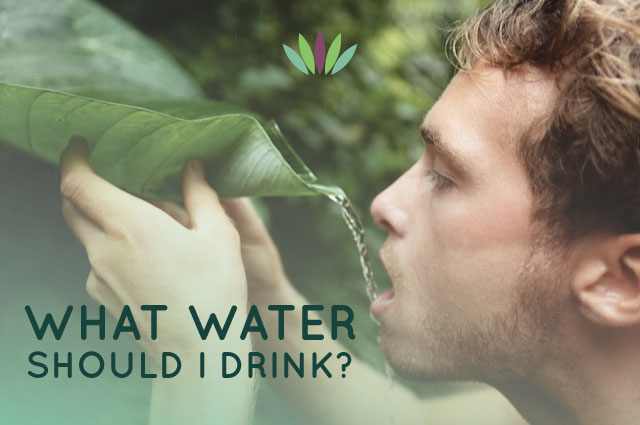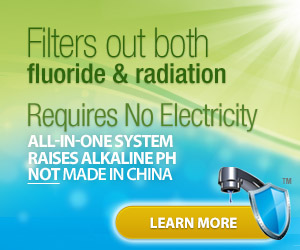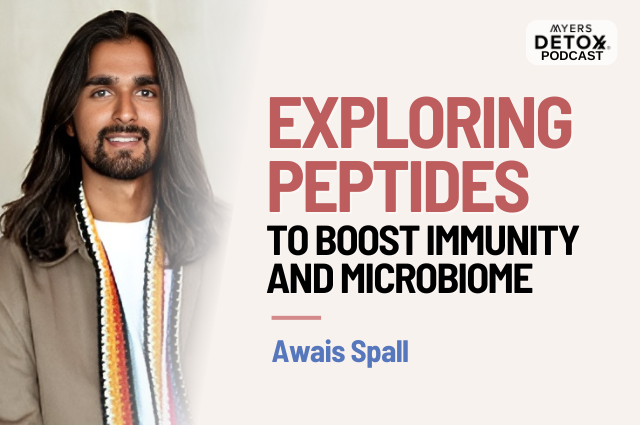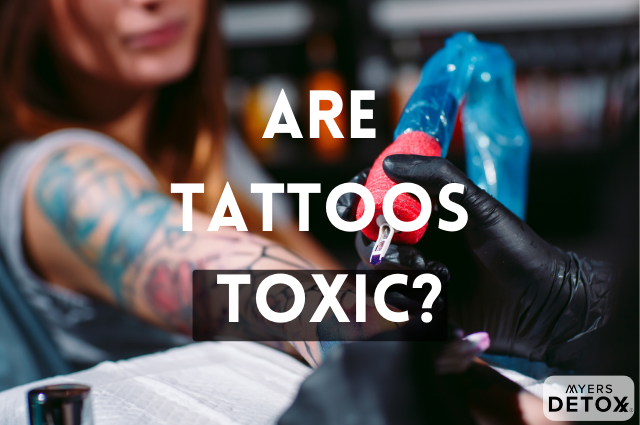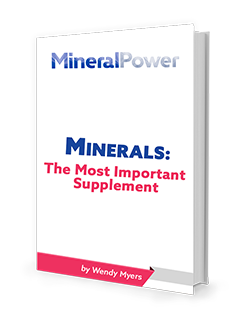The answer to this question lays the basic foundation of health. When I first asked myself this question, I began a quest that left me frustrated and bewildered. There are too many options! This article serves to demystify what kind of water you should drink.
As a health coach, I’m always asked, “What kind of water should I drink? Is my water filter adequate? Is tap water ok? Should I only drink alkaline water?” This issue has become increasingly complex. It took me months to figure out what kind of water filtration system to buy and what kind of water to drink. I went all over Los Angeles searching for the ‘best’ water, the best filter, my fountain of youth and health. My discoveries may surprise you.
Types of Water
Pure water is a type of “whole food.” Like other whole foods, when it is tampered with, water loses most of its precious healing properties. Water is tampered with any time one adds anything to it, filters it using anything except carbon, spins it, alkalizes it, or does other things to it. All of these manipulations tend to ruin it, rendering it less healthy and hydrating. To clarify all the confusion, I’ve listed many different types of water or ways in which it can be tampered.
Spring Water. Spring water is the only type of water you should drink. It’s okay if you drink other water occasionally, but try to make spring water the majority of the water you drink. Spring water has been filtered by the earth in ways we do not completely understand, but which works better than any invented means of purifying water. Another advantage is that it contains a wide variety of trace minerals that the human body desperately needs. Ideally, drink only spring water from remote places on earth. It will be freer from pollutants. I like Ice Age water from a remote Glacier in Canada for its mineral profile. I love Hawaiian waters that run through mineral-rich volcanic rock (Hawaii is one of the most remote places on earth). I also drink Mountain Valley Spring Water from Arkansas. It’s one of the only spring waters I have found bottled in glass. Other spring water examples include Evian, Arrowhead Mountain Spring Water, Volvic, and Poland brands. You can also cheaply buy safe spring near you at Findaspring.com.
Artesian Water. This is spring water. Artesian water comes from a well that is dug in the earth. When the well is dug, the internal pressure from the hole causes the water to burst forth spontaneously from the well like a fountain. Artesian water comes from a well that taps a confined aquifer – a water-bearing underground layer of rock or sand in which the water level is above the top of the aquifer. Examples include Fiji brand water.
Reverse Osmosis. This method involves passing water at high pressure through a plastic membrane with tiny holes in it. This is a common filtration method in many bottled waters as it produces very pure water. It is used in almost all home and commercial “drinking water” machines such as those in water stores, supermarkets and health food stores. It is also used industrially in bottling plants for soda pop, soups, juices, beer and many other drinks. I bought a reverse osmosis alkaline water system for $1100 before I had done my research. Excited about my new purchase, I drank 10 glasses of water a day. I drank more and more, drinking ten glasses of water a day for weeks. But I was still thirsty! I never felt satiated. Then I read on Dr. L Wilson’s website that reverse osmosis water does not hydrate as well as spring water. I can certainly attest to this. Since then, I have only drunk spring water and feel fully hydrated after 8 glasses a day. Reverse osmosis, sadly, is not good for drinking. In fact, it is terrible. It does not matter if someone has added minerals back to it. These things cannot undo the damage to the water that occurs due to passing it through the plastic membrane. Examples include Dasani.
Alkaline Water. Alkaline water has been ionized to increase its pH to between 8 and 10. Some believe that the health benefits of alkaline water are overstated, and that it has little to do with stabilizing or reducing acidity in the body, but is more of a marketing scam. A major issue with this kind of water is that there is not enough research conclusively showing the benefits actually exist. Even if many of the claims are true, the only people who really would benefit are individuals who have trouble keeping their body alkaline due to a bad diet, or people who have problems with their natural buffering systems.
Alkaline water systems include the Jupiter, I-Water, Kangen, and others. Some devices pass tap water through a carbon filter, which does not remove many toxic metals and often does not even remove too many toxic chemicals because the water must move quickly through the filter. Then the water passes over electrified platinum and titanium plates to alkalinize it. Platinum is a deadly toxic metal, as is titanium. Some people find that they develop extreme platinum or titanium metal toxicity after using these machines. It creates a very toxic, artificially alkaline water that still contains most tap water toxins as well. Because of this problem alone, I do not recommend these filters.
Other water alkalizers begin with reverse osmosis water, to which coral calcium is added to make it more alkaline. This form of calcium contains toxic metals as well. Because of the nature of reverse osmosis water, the toxic metals easily reach the brain and other tissues, where they cause all kinds of health problems.
Some say alkaline water is beneficial because of its alkalinity (High pH-balance) and ORP (Oxidation Reduction Potential) that makes it an antioxidant. However, the antioxidant value only lasts 18-24 hours after it’s made. The higher pH will last approximately 1-2 weeks. The smaller molecule cluster size of its water will last about 1-3 months. Given these facts, bottling alkaline water makes no sense, because the health benefits are gone is such a short period. Don’t waste your money.
It is far better to alkalize the body with lots of vegetables, drinking spring water, and targeted supplements. Never drink alkaline water for more than a few weeks.
Tap Water. Tap water contains heavy metals, fluoride, chlorine, medicines like antibiotics and antidepressants and hundreds of chemicals, many of which are not even measured or regulated. Fluoride causes many, many side effects, weakening bones and increasing your chance of developing osteoporosis and cancer, yet it’s added to almost every municipal water supply in the country. Drink it if you dare. Tap water, if unfiltered, often has too many toxic metals and chemicals in it to be good for drinking. If tap water is filtered with only carbon, then it will hydrate the body and can be used for drinking, but is not usually as good as a high quality spring water. Note that carbon can remove some chlorine, but not fluorides. Since city regulators do not monitor or filter for medications, there are hundreds of medications in your tap water. Probably not a good idea to drink tap water.
Drinking water. Drinking water comes from a municipal source, but is better known as tap water. Don’t bother paying for bottled drinking water that you can get out of your tap. Examples include Sahara and Kirkland brands.
Distilled Water. Distilled water has gone through a rigorous filtration process to strip it not only of contaminants, but any natural minerals as well. When water is distilled, by boiling it and condensing it, all solid matter is left except chemicals that were in the water. Most industrial distillers have methods to capture these substances to prevent them from remaining in the water. For this reason, I find that industrially distilled water is the very best. I do not recommend buying a home distiller because they cannot match the purity of industrial distillers. Spring and tap water can supply 30 or 40 trace minerals that the body needs in small quantities, but distilled water is lacking minerals rendering it inferior for this reason. Because it is devoid of minerals, distilled water grabs and holds onto minerals in the body, a process called chelation. Distilled water can be used for a few months to remove toxic metals and toxic chemicals from the body quite effectively. Drinking distilled water for longer than this, however, always results in vital mineral deficiencies. Examples of distilled water include Sparkletts and SmartWater.
Mineral Water. Mineral water contains no less than 250 parts per million total dissolved mineral solids and is defined by its constant level of mineral and trace elements at the point of emergence from the source. No minerals can be added to the water. Examples include Panna from Italy.
Sparkling Mineral Water. Yes, the fizzy kind. But what makes it fizzy? This type of water contains the same amount of carbon dioxide that it had when it emerged from its source. Sparkling bottled waters may be labeled as sparkling drinking water, sparkling mineral water, sparkling spring water, etc. Examples include Perrier and Pellegrino.
Well Water. Well water can be fine, but often it is contaminated. This is especially the case if one lives in a location that was ever used for industry or agriculture. Even if your location is pristine, wells can easily become contaminated, especially with minerals such as iron and manganese. State testing laboratories cannot or will not test for hundreds of toxic chemicals and they often don’t even test for contaminants such as high levels of manganese. If you have a well, try to check carefully before using it for drinking purposes. Many of my clients that drink from wells usually have manganese toxicity, but usually have others as well. This shows in their hair mineral analysis.
Bottled Water
Bottled water pollutes the environment and is often nothing more than tap water. Always recycle! When you must use bottled water, choose brands with high quality scores on EWG’s Bottled Water Scorecard.
Environmental Working Group, a consumer watchdog, analyzed 173 bottled water products to determine if companies disclose information on where water comes from, how or if their water is treated, and whether the results of purity testing are revealed. The nonprofit also looked at how effective and advanced the water treatment methods were that were used on the bottled waters.
Consumers have the right to know where their water comes from and what’s in it so they can make informed choices that affect the health of themselves and their families. Tap water is regularly tested and consumers can find contaminants in their tap water online. That’s not the case with bottled water, which is not required to disclose that information to consumers. For this reason, bottled water is often no better than tap water.
Find out what’s in your bottled water in EWG’s Bottled Water Scorecard. Results for 173 bottled water brands are included in the report. Filtered tap water received the best grade, A, from EWG because it is purer than bottled water. Here are the scores for the top 10 U.S. brands:
1. Pure Life Purified Water (Nestle), EWG grade = B
2. Arrowhead Mountain Spring Water (Nestle), EWG grade = C
3. Aquafina Purified Drinking Water (Pepsi), EWG grade = D
4. Dasani Purified Water (Coca-Cola), EWG grade = D
5. Deer Park Natural Spring Water (Nestle), EWG grade = D
6. Ice Mountain Natural Spring Water (Nestle), EWG grade = D
7. Ozarka Natural Spring Water (Nestle), EWG grade = D
8. Poland Spring Natural Spring Water (Nestle), EWG grade = D
9. Zephyrhills Natural Spring Water (Nestle), EWG grade = D
10. Crystal Geyser Natural Alpine Spring Water (CG Roxane), EWG grade = F
Functional Water
Slick marketing campaigns have managed to turn an essential part of your diet into a pure disaster. We now have an ever-widening array of flavored water, “zero calories” water, and so-called “enhanced” or “functional” water products on the market. Avoid them all. Typically, they will add artificial sweeteners and artificial coloring. These enhanced water products, if they don’t contain aspartame, contain enormous amounts of sugar and fructose, adding to the many health problems caused by both excessive fructose consumption and genetically engineered ingredients (as most high fructose corn syrup is made from genetically modified corn). Clearly, any type of water other than spring or purified water is not going to improve your health, and should be avoided entirely.
Water Filters
Even though it’s best for you body to drink spring water, it is not always practical. Installation of a home water filter system is wise for drinking, cooking, washing vegetables, and even showering. One of your best bets for clean, pure water is to simply install a high quality water filter for your entire home. A whole house carbon filter will remove contaminants from steamy chemical-laden vapors you and your family inhale while showering and washing dishes. It’s wise to install a house filter because the body absorbs a substantial amount of toxins, including fluoride and chlorine, through the skin during showers and baths.
I’ve compiled a guide for you to figure out the best filtration system for your needs. For more information on why, how, and where to buy a filter, see EWG’s Water Filter Buying Guide. Great filters and live customer service to help you choose the right system for you can be found at APS Water. Follow these steps to find out the filtration system that’s right for you.
1. Consider the style of water filter that will best fit your needs.
Household water filters generally fall into one of two categories: point-of-entry units, which treat water before it gets distributed throughout the house; and point-of-use units, which include countertop filters (e.g. filter pitchers or countertop water cooler ), faucet filters, and under-the-sink units.
2. Determine what contaminants you need to remove. You may already know what chemical pollutants you want to be sure your water filter removes. But if you don’t, a great place to start is to look at what kinds of contaminants are showing up in your community’s drinking water. Look up your water system on EWG’s tap water database. Can’t find your system? Call your local water utility and ask them to send you a copy of their Consumer Confidence Report, which contains information on its testing of your system’s water.
3. Choose the type of filter that best fits your needs. This list was reprinted from EWG’s site.
- Carbon/Activated Carbon: Activated carbon chemically bonds with and removes some contaminants in water filtered through it. Carbon filters vary greatly in effectiveness: some just remove chlorine and improve taste and odor, while others remove a wide range of contaminants including asbestos, lead, mercury and VOCs. However, activated carbon cannot effectively remove other common “inorganic” pollutants such as arsenic, fluoride, hexavalent chromium, nitrate and perchlorate. These filters come in two forms, carbon block and granulated activated carbon.
-
- Carbon Block: Carbon block filters contain pulverized activated carbon shaped into blocks under high pressure. They are typically more effective than granulated activated carbon filters because they have more surface area of activated carbon. Their effectiveness depends in part on how quickly water flows through. A proprietary form called “Fibredyne block” claims to have a higher sediment holding capacity relative to other carbon block filters.
- Granulated Activated Carbon: These filters contain fine grains of activated carbon. They are typically less effective than carbon block filters because of their smaller surface area. Effectiveness also depends how quickly water flows through.
- Reverse Osmosis: This process relies on a semi-permeable membrane that retains particles larger than water molecules. Reverse osmosis can remove many contaminants not removed by carbon, including arsenic, fluoride, hexavalent chromium, nitrates and perchlorate. Quality varies, both in terms of the membrane system itself and the carbon filter typically used with it. The filters use 3 times to 20 times more water than they produce, so they are usually used only for drinking and cooking water.
- Ceramic: Ceramic filters have with very small holes throughout the material that block solid contaminants such as cysts and sediments from passing through. They do not remove chemical contaminants.
- Deionization: An ion exchange process removes mineral salts and other electrically charged molecules from water. The process cannot remove non-ionic contaminants (including disinfection byproducts and other common volatile organic compounds) or microorganisms. This filtration method makes the water alkaline.
- Ion Exchange: This technology passes water over a resin that replaces undesirable ions (charged particles) with others that are more desirable. One common application is water softening, replacing calcium and magnesium with sodium. The resin must be periodically “recharged” with replacement ions. Ion exchange filters are occasionally combined with other types of filters and are used in water softeners, described below. This filtration method makes the water alkaline.
- Ozone: Ozone kills bacteria and other microorganisms and is often used in conjunction with other filtering technologies. It is not effective in reducing levels of chemical contaminants.
- UV (ultraviolet): These systems use ultraviolet light to kill bacteria and other microorganisms. They cannot remove chemical contaminants.
- Water Softeners: These devices use ion exchange to lower levels of calcium and magnesium (which can build up in plumbing and fixtures) as well barium and certain forms of radium. They do not remove most other contaminants. Since water softeners usually replace calcium and magnesium with sodium, treated water typically has high sodium content. Some people may be advised by their physicians to avoid softened water. It is also not recommended for watering plants and gardens for the same reason.
No filter will give you good performance over the long-term unless it receives regular maintenance. As contaminants build up, a filter cannot only become less effective, but also make your water worse by releasing harmful bacteria or chemicals back into your filtered water.
The Water Filter I Recommend
In my research, I’ve come across many different products but it was the Ultra-UC Water Filter/Revitalizer made by PureEffect Advanced Filtration that truly stood out from all other water filters. I love that they have so many different models to meet everyone’s needs, including a whole house filter.
It caught my attention because the Ultra-UC Water Filter/Revitalizer made by PureEffect Advanced Filtration is the first filter I’ve seen that removes such a broad spectrum of pollutants, removes radiation, restores water’s natural pH, isn’t made in China, and is affordable for most households. And if you move, you can bring it with you. It truly is a water filter for every household.
Water Pollutants Removed
To the best of my knowledge the Ultra-UC Water Filter/Revitalizer is the only All-In-One system of it’s kind that removes:
1. Radioisotopes that get into our water from Leaking Nuclear Plants, Fukushima Fallout, and Uranium/Plutonium Mining. This is the only filter I’ve ever seen that removes radioactive particles.
2. Drug Residues that are not required by law to be removed at water treatment plants. This is the only filter I’ve seen, aside from reverse osmosis, to remove drug residues.
3. Fluoride using an all-natural alumina-free activated carbon bonded with calcium, shown to be 20% more effective at removing fluoride than the commonly used activated alumina. Fluoride blocks thyroid function! You don’t want to drink this toxin added to most tap water sources in the US.
4. Disinfection Chemical Additives including both Chloramines and Chlorine.
5. Disinfection Chemical By-Products such as Trihalomethanes, one of which is Chloroform.
6. Heavy Metals including Lead, Aluminum, Mercury, Barium, Iron & Other Positively Charged metal ions.
7. VOC’s (Volatile Organic Compounds) such as benzene, xylene and other solvents that are byproducts of the petroleum industry.
8. Agricultural Contaminants such as pesticides, herbicides, and insecticides.
9. Microbial Cysts including Giardia & Cryptosporidum, which survive disinfection.
10. Sediment down to ultra-fine size of 0.5 Micron, approximately 50x smaller than a grain of beach sand.
Plastic, Glass, or Stainless Steel?
Plastic chemicals can leach out of plastic bottles and contaminate the water, like phthalates and bisphenol-A (BPA). Then there’s the issue with all that plastic trash being generated, which is wreaking havoc on our environment. Less than 30% of plastic bottles are recycled. Glass is the best option for your drinking water.
Chemicals used to make plastic bottles may leach into the contents, especially when the contents are heated (during transport, storage, or left in your car). One of the primary concerns is bisphenol-A or BPA, a hormone disruptor that mimics estrogen in your body. Research suggests that BPA exposure is linked to an increased risk of cardiovascular disease, diabetes, cancer, obesity, estrogen dominance syndrome and a whole host of diseases. These plastics get in your body and gum up your metabolic pathways, inhibiting health and weight loss. Time Magazine reported, “BPA is particularly worrisome simply because it is so common. Nearly every American has some amount of BPA in his or her body, in part because plastics are so ubiquitous.”
While many plastic water bottles don’t contain BPA, bottles with resin codes 3 or 7 in the recycle triangle may. However, 95 percent of all plastic products in one study tested positive for estrogenic activity, meaning they can still disrupt your hormones even if they carry a BPA-free label. Even more disconcerting is the finding that BPA-free plastics can be even more harmful than BPA plastics. Rather than BPA, a more harmful plastic hardener, BPS, may be used. BPS is found to be almost 20 times more harmful that BPA, but there is very little research into this substance.
Consumers who switch from plastic water bottles to metal ones in hopes of avoiding the risk that bisphenol-A will leach into their beverages aren’t necessarily any better off, a new study finds. Some metal water bottles leach more BPA than do ones made from the now-pariah plastic due to an epoxy-resin lining based on BPA’s recipe. However, most stainless steel bottles do not have this liner. Stainless steel leaches metal into your water as well. I don’t know about you, but I took one drink and couldn’t stand the metallic taste of water from a stainless steel bottle.
Glass bottles, however, also leach chemicals, including aluminum, explains a study by Clemens Reimann of the Norges Geologiske Undersøkelse in Norway. Aluminum is sometimes added to soda-lime glass to make bottles more durable. Soda-lime glass is used for everyday items such as bottles for beverages, jars for food, and drinking glasses. However, it’s much safer than plastic. It’s the best and safest option for your drinking water. This is why I drink Mountain Valley Spring Water from Arkansas. It’s one of the only spring waters I have found bottled in glass.
Have you started drinking water yet? When I began writing this article, I started chugging water immediately and don’t plan to stop! Do your health a favor. Reduce your coffee, skip the sodas, drink the crappy water you have in your house and don’t ever buy it again, start drinking pure spring water by the gallon and invest in an Ultra-UC Water Filter/Revitalizer filter or whole house filter.
Did you buy a water filter and later regretted it? Do you have a story like mine about drinking tons of purified water and not feeling hydrated? Get ripped off buying an expensive, gimmicky water filtration system? Tell me your story by leaving a comment below.
SaveSave


